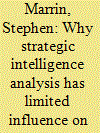| Srl | Item |
| 1 |
ID:
155386


|
|
|
|
|
| Summary/Abstract |
Insights and models from the subfield of political development—timing and sequencing, temporality and long-term processes, and intercurrence—can improve the work of strategic intelligence analysts by enhancing discontinuity and opportunity analysis, enriching conceptual schema and imagination, and mitigating a number of problematic cognitive biases. Broadly, a strong grounding in key concepts of political development will help analysts engage in more complex and integrative thinking, a factor which has been found to be a positive determinant of accuracy in forecasting.
|
|
|
|
|
|
|
|
|
|
|
|
|
|
|
|
| 2 |
ID:
154858


|
|
|
|
|
| Summary/Abstract |
Why does strategic intelligence analysis have limited influence on American foreign policy? Intelligence analysis is frequently disregarded, this paper contends, because it is a duplicated step in the decision-making process and supplements but does not supplant policy assessment. Many intelligence analyses will confirm policy assessments and be redundant or – if the assessments are different – policy-makers will choose their own interpretations over those of intelligence analysts. The findings of this paper provide scholars with important insights into the limits of intelligence analysis in the foreign policy process as well as recommendations for increasing its positive impact on policy.Why does strategic intelligence analysis have limited influence on American foreign policy? Intelligence analysis is frequently disregarded, this paper contends, because it is a duplicated step in the decision-making process and supplements but does not supplant policy assessment. Many intelligence analyses will confirm policy assessments and be redundant or – if the assessments are different – policy-makers will choose their own interpretations over those of intelligence analysts. The findings of this paper provide scholars with important insights into the limits of intelligence analysis in the foreign policy process as well as recommendations for increasing its positive impact on policy.
|
|
|
|
|
|
|
|
|
|
|
|
|
|
|
|